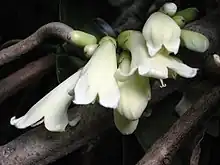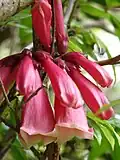| Tecomanthe | |
|---|---|
 | |
| Tecomanthe speciosa | |
| Scientific classification | |
| Kingdom: | Plantae |
| Clade: | Tracheophytes |
| Clade: | Angiosperms |
| Clade: | Eudicots |
| Clade: | Asterids |
| Order: | Lamiales |
| Family: | Bignoniaceae |
| Tribe: | Tecomeae |
| Genus: | Tecomanthe Baill. |
| Species | |
|
See text | |
Tecomanthe is a genus of 5 species of tropical or subtropical forest lianes in the family Bignoniaceae. They have attractive trumpet-like flowers and glossy leaves. They are native to Australia, Indonesia, New Guinea, New Zealand, and the Solomon Islands.
Species
| Image | Name | Description | Distribution |
|---|---|---|---|
.JPG.webp) | Tecomanthe burungu (Roaring Meg Creek trumpet vine or pink trumpet vine) | a newly described species in 2018 | Queensland.[1][2] |
 | Tecomanthe dendrophila (or T. venusta) | The 11 cm flowers are pink and creamy-yellow, ageing to a uniform magenta-pink. | grows in the Moluccas, throughout New Guinea, and east into New Britain and the Solomon Islands. |
| Tecomanthe hillii | pink flowers | eastern Queensland. | |
 | Tecomanthe speciosa | Extremely rare, being only one plant exists in the wild, T. speciosa is now in cultivation, and is a rampant woody vine with cream flowers. It will grow in warm temperate climates, but is very sensitive to frost. | endemic to the Three Kings Islands off northern New Zealand |
| Tecomanthe ternatensis | White flowers that turn pink as they age. | Its natural range is from the Moluccas east to northwest New Guinea. | |
| Tecomanthe volubilis | It grows in mossy forests at elevation, and will grow in warm temperate conditions. It has rose-pink flowers. | endemic to New Guinea | |
References
- ↑ "Tecomanthe sp. Roaring Meg". Australian Plant Name Index (APNI), IBIS database. Centre for Plant Biodiversity Research, Australian Government. Retrieved 25 July 2013.
- ↑ Ford, A. J.; Zich, F. A. (December 2018). "Tecomanthe burungu (Bignoniaceae), a new species from northern Queensland". Australian Systematic Botany. 31 (5–6): 481–486. doi:10.1071/SB18031. ISSN 1030-1887.
- St Andrews Botanic Garden, Plant of the month: Tecomanthe dendrophylla. Accessed 26 July 2013.
This article is issued from Wikipedia. The text is licensed under Creative Commons - Attribution - Sharealike. Additional terms may apply for the media files.